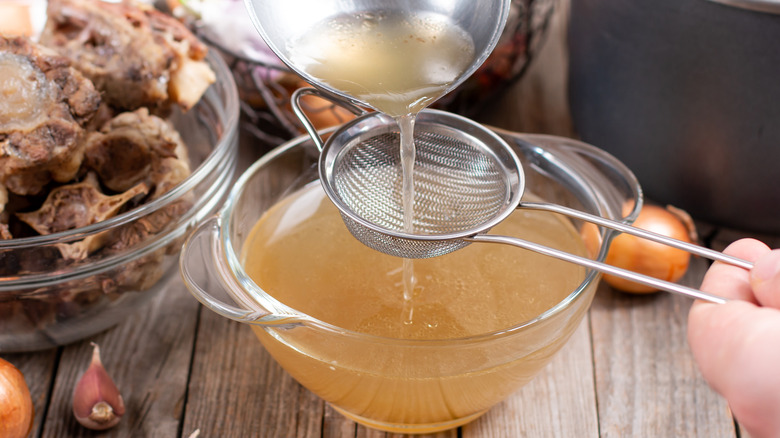When You Drink Bone Broth Every Day, This Is What Happens To You
Bone broth is both a recent health trend embraced by wellness enthusiasts and a long-time favorite home remedy favored by grandmothers. It is primarily known for its positive effect on joint health and fighting colds. However, bone broth's newfound popularity also comes from its numerous potential health benefits, which include boosting your bone health, aiding sleep and weight loss, and its purported anti-inflammatory effect (via Healthline).
If you hadn't heard about bone broth before, maybe you've heard of it under its more general name: stock (which is pretty much the same thing). However, while you can make stock out of veggies, bone broth is, as its name implies, made out of animal bones. But fear not pescatarians! While bone broth is typically made from chicken, pork, and cattle bones, you can make this health-promoting elixir out of fish fins and bones as well.
All you need to make your own homemade bone broth are bones, water, and an acidic ingredient such as lemon juice or vinegar, which helps draw out all the goodies from the bones. You may add salt, pepper, and your favorite veggies for added flavor. Once you have everything you need, boil everything together and then simmer for up to 24 hours. You may drink your broth whenever you want or even freeze it to enjoy in a couple of months.
Drinking bone broth can help you fight the flu and common cold
Have you ever caught a cold and had everyone tell you that a warm bowl of chicken soup will make you feel better? Well, there's a perfectly reasonable explanation for that, which has to do with the soup's or broth's protein content. According to a 2021 study published in the scientific journal Medicina, bone broth is a rich source of high-quality protein. Indeed, it is 75% comprised of this nutrient, and more than half of its protein content is essential amino acids — the ones your body can't produce, so you must get them from foods. The primary amino acids found in bone broth are glutamic acid, histidine, arginine, asparagine, lysine, glycine, threonine, and valine, which are behind many of its benefits.
Amino acids are the building blocks of proteins, and they're needed to form antibodies that fight infections. In fact, a review published in the British Journal of Nutrition in 2007 suggests that a protein deficiency — or more specifically, an amino acid deficiency — can impair your immune system, which increases your risk of catching infectious diseases. Therefore, by consuming bone broth, you're providing your body with the key nutrients it needs to fight viral infections like the flu and common cold.
It may promote healthy bones
Bone broth is known for its rich nutritional profile. However, one quality that may go overlooked is its high mineral content. A study published in Food and Nutrition Research explains that minerals found in animal bones are transferred to the broth when the bones are cooked. Therefore, since structurally speaking bones are made up of calcium, bone broth is a rich source of this particular mineral. In fact, the study suggests that bone broth can double as a calcium supplement since it is an accessible food choice for those who need to increase their calcium intake but have dairy allergies, are lactose intolerant, or simply don't have regular access to dairy products.
But bone broth's positive effect on bone health is not based solely on its calcium content. According to a 2009 study published in the Journal of Bone and Mineral Research, protein is an essential nutrient when it comes to preventing the loss of bone mineral mass, which leads to fragile or brittle bones and is a risk factor for osteoporosis — the most common bone disease affecting about 10.2 million people aged 50 and over in America as of 2010, according to the Centers for Disease Control and Prevention (CDC). Therefore, drinking bone broth daily may boost your bone health due to its high calcium and protein content.
Bone broth reduces inflammation and improves gut health
According to the American College of Gastroenterology, inflammatory bowel diseases (IBDs) such as ulcerative colitis and Chron's disease are chronic conditions characterized by an inflammation in the lining of different parts of the digestive system. While there's currently no cure for IBDs, medical and nutritional treatments focus on relieving the symptoms and preventing complications, which include bleeding, diarrhea, anemia, and weight loss due to malnutrition.
An easy way to improve IBD symptoms through nutrition is by drinking bone broth, as suggested by scientific and anecdotal evidence. Rachel Dyckman, a dietitian with IBD specializing in gastrointestinal health, said via Everyday Health that she includes bone broth as part of her diet during an IBD flare because its collagen and overall protein content may promote the healing of the intestinal lining, a claim backed up by scientific research.
In fact, a 2021 study published in the scientific journal Medicina states that amino acids in bone broth provide anti-inflammatory properties and may promote the proper functioning of the digestive system. The study found that glutamic acid can significantly reduce inflammation of the large intestine's mucosa, while histidine can reduce the expression of inflammatory markers that cause tissue damage and injuries to the mucosa.
Collagen in bone broth may boost your skin health
As described in a 2018 study published in the International Journal of Molecular Sciences, collagen is the most abundant protein in the human body. It is widely present in your skin — or to be precise, in your dermis (the middle layer of the skin), according to the Cleveland Clinic. Collagen provides strength and elasticity to your skin. However, you'll slowly lose it as you age, which leads to skin thinning, sagging, and ultimately to the formation of wrinkles.
Unfortunately, collagen loss is an inevitable sign of aging. Luckily, your diet can help you boost your skin health. Drinking bone broth can slow down premature aging as it is a rich and affordable source of collagen, helping you replenish age-related losses. A 2019 literature review published in the Journal of Drugs in Dermatology explains that animal collagen can be extracted from connective tissues, such as bones (which can be consumed in the form of bone broth or processed into collagen supplements). After reviewing 11 studies with a total of 805 participants, researchers determined that oral collagen supplementation promotes wound healing and increases skin elasticity, hydration, and collagen density, which are considered both short- and long-term benefits for skin health.
Nutrients in bone broth may promote sleep
Have you ever binge-watched your favorite TV show and stayed up past midnight on a weekday? Or perhaps you're a night owl who can't go to bed early but still has to get up at the crack of dawn to go to school or work. Whether it may be intentional or not, lack of sleep is detrimental to your health, as it is associated with an increased risk of chronic conditions like obesity, type 2 diabetes, and heart disease (per the CDC).
According to the American Academy of Sleep Medicine, adults should get at least seven hours of sleep per night. Luckily, you may be able to improve your sleep by making some minor changes to your bedtime routine, such as removing electronic devices from your bedroom; avoiding large meals, caffeine, and alcohol before bedtime; ditching tobacco; maintaining a regular sleep schedule; and sleeping in a dark, quiet, and comfortable room, the CDC reveals.
However, as easy as it may seem, those changes just don't cut it for some people. If you need some extra help, adding bone broth to your diet may increase your chances of enjoying a good night's sleep. A 2015 study in rats published in Neuropsychopharmacology found that treatment with the amino acid glycine (which is present in bone broth) may be a novel and safe approach that improves sleep quality and reduces sleepiness and fatigue during the day. Yet, while the results seem promising, human research is still needed.
Collagen in bone broth promotes joint health
Osteoarthritis is a degenerative joint disease also known as "wear and tear" arthritis. According to the CDC, it is the most common form of arthritis, affecting over 32.5 million Americans, and it is characterized by symptoms such as joint pain, stiffness, swelling, and reduced range of motion. The disease is caused by the deterioration of cartilage, a rubbery substance made out of collagen (along with other proteins and minerals) that allows the bones within your joints, such as knees or elbows, to move without rubbing each other (via Healthline). However, once the cartilage wears down, it can no longer prevent bone friction. Thus, your bones come in contact with one another, leading to extreme pain and disability.
There is currently no cure for osteoarthritis. However, research suggests that dietary collagen may have beneficial effects on bone health. One literature review published in 2015 in Nutricion Hospitalaria found that hydrolysate collagen, a degraded form of collagen obtained from collagen-rich animal tissues such as bones, may stimulate the regeneration of collagen-rich tissues in humans. The review determined that it may increase collagen production, which can help prevent and reduce joint pain. Luckily, as determined by a study published in Frontiers in Nutrition, bone broth is a rich source of collagen, and as such, it may be an easy and safe way to prevent degenerative joint diseases.
One study found that bone broth may improve heart health
Bone broth has been a home remedy for centuries (per a study published in the Mongolian Journal of Agricultural Sciences). And given its ever-growing popularity in the health and wellness world, it seems that research has begun to look for potential benefits of drinking bone broth for heart health.
One particular test-tube study published in 2019 in the Journal of Agricultural and Food Chemistry found that amino acids and other small proteins in bone broth had an inhibitory effect on enzymes that play a role in the development of heart disease. By blocking these enzymes, the broth seems to help control high blood pressure, blood clot formation, and high blood sugar levels, which are risk factors for heart disease. However, note that this is a test-tube study, which means that its results cannot be directly translated as beneficial for human health. So, while they seem promising, research in humans is most certainly needed to validate the claims fully.
Bone broth may even help with weight loss
When it comes to weight loss, everyone seems to be looking for the fastest, easiest way to achieve it, when more often than not, a couple of changes to your diet and lifestyle is what may give your metabolism that much-needed boost, according to Healthline. While a calorie deficit is what will get you to lose the extra pounds (per Livestrong), some nutrients and foods can certainly help you reach your weight-loss goals, and bone broth surely delivers both.
On the one hand, a 2020 study published in the Journal of Obesity and Metabolic Syndrome states that proteins provide weight loss effects that can also help prevent weight regain. The study explains that a high protein intake can increase the levels of hunger-reducing hormones while decreasing the levels of hunger-promoting hormones, leading to increased feelings of fullness, which controls your appetite and reduces food intake.
On the other hand, a 2007 literature review published in Appetite found that eating soup as an entrée or appetizer may reduce hunger levels, increase feelings of fullness, and reduce the food intake for the following course. Since bone broth is pretty much a a high-protein soup, it may be a healthy ally in your weight-loss journey.
It may contain toxic metals
Despite its numerous potential health benefits, some believe that drinking too much bone broth may come with a downfall because cooking bones helps transfer their minerals into the broth. Unfortunately, this doesn't only apply to minerals that are beneficial to your health, but also to toxic ones, as is the case with lead. Lead is a toxic metal that accumulates in teeth and bones. According to the World Health Organization (WHO), lead poisoning has adverse health effects in the long run for adults, such as high blood pressure and kidney damage. Still, it is far more dangerous for children since their developing bodies may absorb up to fivefold as much lead as adults.
Given that lead is stored in bones, it is believed that bone broth may become easily contaminated with it. According to a small 2013 study published in Medical Hypotheses, chicken-bone broth made with only bones may contain up to 7 micrograms per liter — or parts per billion (ppb). For reference, the Environmental Protection Agency (EPA) established 15 ppb as a safety threshold for lead in drinking water.
Nevertheless, further research on the matter, such as a 2017 study published in Food & Nutrition Research, determined that such small concentrations mean the hazard is relatively low and that the risk of ingesting heavy metals from bone broth is minimal.
Drinking bone broth may keep you hydrated
Water is an essential nutrient that's vital for numerous bodily functions, including helping regulate body temperature and transport nutrients among many others, as reported by a 2010 review published in the European Journal of Clinical Nutrition. The review further explains that sedentary adults should drink one and a half liters of water per day (roughly eight glasses of water) to avoid dehydration, which can affect heart rate, consciousness, energy levels, and speech. However, drinking water is not the only way to stay properly hydrated. You can also reach your daily water needs by consuming water-rich foods, such as soups and broths (via Healthline).
Because bone broth is made by boiling and then simmering bones in water, drinking it daily will definitely contribute to your overall water intake. In fact, per the U.S. Department of Agriculture (USDA), chicken bone broth is comprised of 98% water, and consuming 1 cup provides 244 milliliters of the nutrient. Therefore, if drinking plain water is a bit of a challenge for you, enjoying some broth can be a tasty solution to meeting your water requirements.











